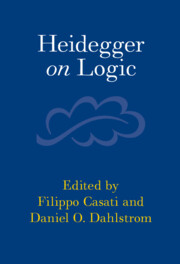Book contents
- Heidegger on Logic
- Heidegger on Logic
- Copyright page
- Contents
- Contributors
- Acknowledgments
- Method of Citation
- Introduction
- Part I Normativity, the Phenomenology of Assertions, and Productive Logic
- Part II Language, Logic, and Nonsense
- Chapter 4 Logic, Language, and the Question of Method in Heidegger
- Chapter 5 Nonsense at Work
- Chapter 6 Heidegger’s “Destruction” of Traditional Logic
- Part III Paradox, the Prospects for Ontology, and Beyond
- Part IV Logical Principles and the Question of Being
- References
- Index
Chapter 6 - Heidegger’s “Destruction” of Traditional Logic
from Part II - Language, Logic, and Nonsense
Published online by Cambridge University Press: 15 September 2022
- Heidegger on Logic
- Heidegger on Logic
- Copyright page
- Contents
- Contributors
- Acknowledgments
- Method of Citation
- Introduction
- Part I Normativity, the Phenomenology of Assertions, and Productive Logic
- Part II Language, Logic, and Nonsense
- Chapter 4 Logic, Language, and the Question of Method in Heidegger
- Chapter 5 Nonsense at Work
- Chapter 6 Heidegger’s “Destruction” of Traditional Logic
- Part III Paradox, the Prospects for Ontology, and Beyond
- Part IV Logical Principles and the Question of Being
- References
- Index
Summary
Traditional logic dominates Western thinking by centering thinking on propositions and thereby restricting the meaning of "being" to its derivative, categorial meaning. In Heidegger’s view, it fails in this way to realize the promise of a philosophical logic, one that is capable of tracing traditional logic and thinking generally back to their foundation, i.e., the being/unconcealment of the logos from which they are derived. This chapter examines how, as a first step toward realizing that promise, Heidegger questions the supremacy of logic in Western thinking through a “critical deconstruction” of four theses underlying it: the thesis that judgment is the place of truth rather than vice versa, that the copula exhausts the meaning of "being," that nothingness originates from negation rather than vice versa, and that the predicative structure of propositions constitutes the essence of language. In conclusion, the chapter suggests that the construction ultimately accompanying Heidegger’s deconstruction is to be found, not in language as Dasein’s comportment, but in the revealing capacity of tautology to which he appeals in his final seminar (1973).
Keywords
- Type
- Chapter
- Information
- Heidegger on Logic , pp. 111 - 130Publisher: Cambridge University PressPrint publication year: 2022



